
Vaman Dwadashi Vrat
Vamana Jayanti is celebrated to commemorate the incarnation day of Lord Vishnu as Vamana. Vamana Jayanti is celebrated on the Dwadashi date of Bhadrapad Shukla Paksha. According to the Bhagavata Purana, Vamana was the fifth incarnation of Lord Vishnu out of the Dashavatara and the first incarnation in the Treta Yuga.
The first four avatars of Lord Vishnu were in animal form, which was Matsya avatar, Kurma avatar, Varaha avatar, and Narasimha avatar respectively. After this Vamana was the first incarnation in human form. Vamana Dev was born as the son of Rishi Mata Aditi and Kashyapa on the Shukla Paksha Dwadashi of the month of Bhadrapad in Abhijit Muhurta when Shravan Nakshatra was in vogue.
Vamana Dwadashi Katha
Lord Vishnu incarnated Vamana to restore Indra Dev's authority over the heavenly world. King Bali, the supreme devotee and very powerful monster of Lord Vishnu, defeated Indra Dev and established his suzerainty over heaven. Despite being an ardent devotee of Lord Vishnu and the Danavir king, Bali was a cruel and arrogant demon. Bali used to abuse his power to intimidate and threaten the gods and Brahmins. The extremely mighty and invincible sacrifice had become the master of heaven, land, and hell.
After losing his authority from heaven, Indra Dev along with other gods approached Lord Vishnu and pleaded for help, stating his suffering. Lord Vishnu assured Indra Dev that he would be born as a Vamana avatar from the womb of Mata Aditi to get the three worlds liberated from the atrocities of sacrifice.
Importance of Vamana Dwadashi
Ekadashi is very important in Hindu beliefs because each Ekadashi is associated with a particular fast. On this day, people observe fast according to the method and worship the deity associated with the fast. In every Ekadashi, a special result of worshipping a particular god is also obtained. It is believed that if the method of fasting and worship is told, do it in the same way, then God is pleased. That is why people keep fasting for Ekadashi, some people keep fasting for all 24 Ekadashi. But some people keep a special Ekadashi fast according to their wishes.
Nijamati Sewa Diwas: Civil service workers day Bhadra 22
This day translates to civil servant's day but much broader democratic meaning can be derived from placing it as civil service worker's day. This is a public holiday to be observed and reaffirm the commitment toward civil service by civil workers. The ideals and existence of the civil service are directly linked to the state and the role of the civil servants is incomparable as the state provides administration based on its presence and justice to its citizens. The ideals of the civil service and the behaviour of other sectors in this area show public confidence in good governance and administration.
Definition of Civil service: Max Weber
The world-famous German sociologist and philosopher Max Weber, in his various books and ideas, described the bureaucracy as a very profound, sensitive, and ideal mechanism. In Nepal, Civil Service Day is celebrated every year on September 8 with various programs across the country. The administration is needed to run the country and today is the day of service rendered by a government-appointed administrator or so-called employee, Civil Service Day.
Background of Nijamati Diwas
The then Prime Minister Tank Prasad Acharya started celebrating this day on Bhadra 22nd, 2013B.S, the day he brought the Civil Service Act. From 2062 B.S, Nepal started to annually organize and formally observe this day. On this day, the Ministry of General Administration organizes programs to reward the best civil employees, honour the ex-employees, i.e. the retired ones, etc., and encourage and motivate various civil service providers.
This day reaffirms the commitment of civil employees towards the benefit of people and their nation and also emphasis the fact that the state should also be able to provide living wages to the employees so that they do not have to resort to any means to fulfil their obligations.
Many of us have a desire to work in the civil service in the future with Loksewa Books and curriculums in hand, and we must continue to have a strong desire to make the civil service more effective and clean tomorrow.
This bureaucracy, which is mainly based on the taxes we have paid, should be people-oriented, there should be a clear demarcation between politics and the bureaucracy, and the vision of a transparent, service-oriented, and corruption-free administration should be fulfilled. May the transparency and agility of the civil service providers always be maintained, best wishes to all on this day
Good luck to everyone.
Suyog Dhakal
Liked by: